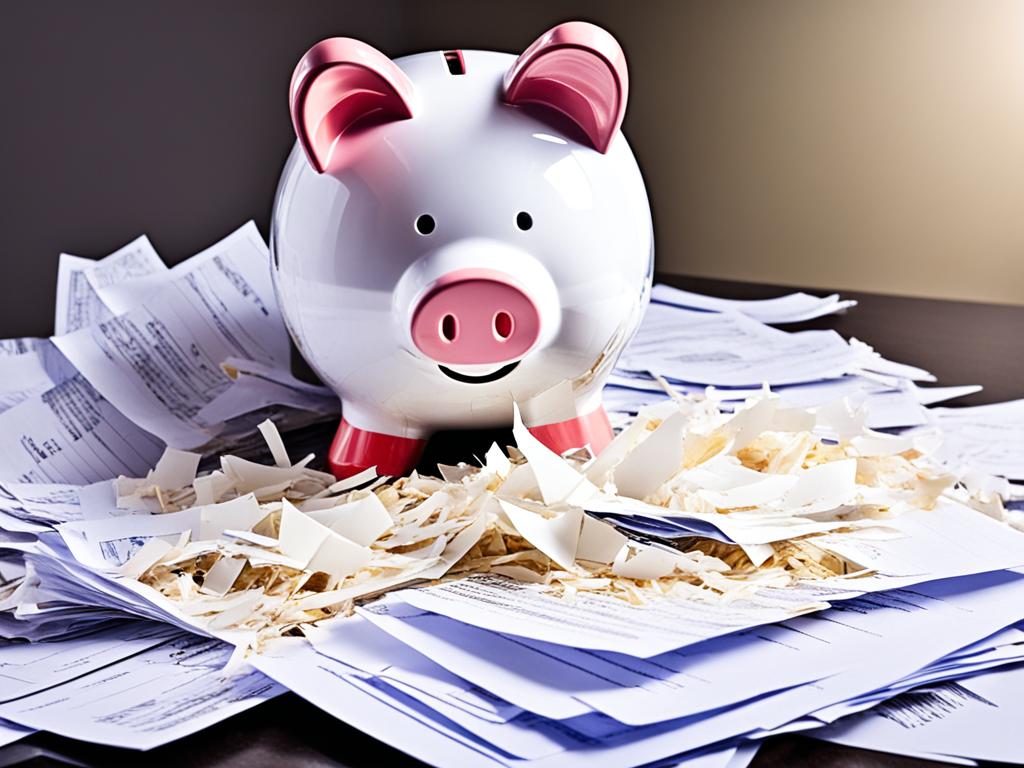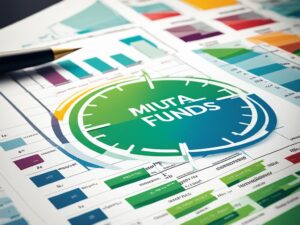
How to Avoid Common Scams and Financial Fraud
In today’s digital world, scams and financial fraud are more common than ever. They threaten our hard-earned savings. From money laundering to identity theft, these threats keep changing. But, you can protect yourself and your money with the right knowledge and care.

This guide will cover different types of financial fraud. It will give you the tools to spot warning signs and keep your assets safe. By learning about these scams, you can make smarter choices in finance and protect your money.
If you’re an investor, a homeowner, or just want to keep your finances safe, this article is for you. It will give you the key knowledge and tips to dodge financial fraud. Start reading and take charge of your finances to keep your money safe.
Understanding Financial Fraud
Financial fraud is a big problem that can hurt both people and businesses a lot. It includes many illegal acts, like money laundering, securities fraud, insider trading, and Ponzi schemes. It’s important to know about these fraud types and how to spot them to keep your money safe.
Types of Financial Fraud
There are many kinds of financial fraud, including:
- Money laundering: This is when illegal money is made to look like it’s from a legal source.
- Securities fraud: This is when people trick others in the stock market, like through insider trading or fake stock price changes.
- Insider trading: This is when people use secret info to make money for themselves.
- Ponzi schemes: These are scams where new money from investors is used to pay off other investors, not actual profits.
Red Flags to Watch Out For
Knowing the signs of financial fraud can help you avoid getting scammed. Some common signs include:
- Investment returns that seem too high to be real.
- Not being clear about how the investment works or refusing to share details.
- Being rushed into investing without enough time to think it over.
- Deals from people or companies that don’t have the right licenses or aren’t registered.
- Offers that promise easy, no-risk profits without any work.

By knowing about the different fraud types and their signs, you can protect your money from these harmful schemes. Always be cautious if an investment seems too good to be true. It’s likely a scam.
Protecting Yourself from Money Laundering
Money laundering is a big financial crime that can hurt individuals and businesses a lot. By knowing how money laundering works and taking steps ahead of time, you can keep yourself and your money safe.
Money laundering means hiding where illegal money came from. Criminals do this by mixing illegal money with legal money, breaking up big transactions, or using fake companies and secret bank accounts. They want to make the illegal money look like it’s from a legal source.
To keep yourself safe from money laundering or financial fraud, here are some tips:
- Learn the signs of money laundering, like unusual cash deals, lots of wire transfers, or many bank accounts.
- Check where big or strange money comes from in your accounts. Tell your bank or the police if you see something fishy.
- Look over your financial statements and account activity often to find any odd or unauthorized deals.
- Choose trusted banks and services that have strong anti-money laundering rules.
- Get advice from a financial advisor or lawyer if you’re worried about money laundering or fraud.
By staying alert and taking action, you can help fight money laundering and protect your money.

Avoiding Securities Fraud and Insider Trading
In finance, it’s key to watch out for securities fraud and insider trading. These illegal acts can harm investors a lot, hurting the financial system’s trust. Knowing the signs helps protect your money.
Identifying Ponzi Schemes
Ponzi schemes are a big problem in finance. They promise high returns to draw in investors. But, they’re just scams. They use new money to pay off old investors, not make real profits.
- Be cautious of investments that promise high returns all the time, no matter the market.
- Avoid schemes that don’t share how they make money or where your cash goes.
- Do your homework on the people or companies behind the investment, looking for any securities fraud or insider trading history.
Being careful and understanding your investments can lower your risk of falling into a Ponzi scheme or other financial fraud traps.

Staying safe from securities fraud and insider trading is a constant task. But, it’s worth it to protect your financial future. Keep up with news, ask questions, and listen to your gut. It could help you dodge these financial fraud traps.
Preventing Embezzlement
Embezzlement is a serious crime that can harm individuals and businesses a lot. It’s important to protect your assets from this crime. By knowing how embezzlers work and using good prevention methods, you can lower the chance of being a victim.
Safeguarding Your Assets
To keep your assets safe from embezzlement, follow these steps:
- Set up strong internal controls: Use good accounting methods, separate financial tasks, and check financial statements often to spot any issues.
- Do thorough background checks: Make sure to check the background of employees, vendors, and contractors to ensure they are trustworthy and honest.
- Have regular audits: Check your financial records and accounts often to find any strange activity or unauthorized deals.
- Train your employees: Teach your team about the signs of embezzlement and why they should report any odd behavior or concerns.
- Look into insurance options: Consider getting fidelity or crime insurance to protect your business if there’s an embezzlement issue.
By doing these things, you can greatly lower the risk of embezzlement and keep your assets safe from fraud.

Prevention is crucial for keeping your finances safe. Always be careful, use strong safety measures, and watch over your accounts and records closely. This way, you can protect your assets for a long time.
Combating Identity Theft
Identity theft is a big worry in our digital world. Cybercriminals are always looking to steal our personal info for financial fraud. This part will talk about how to keep your identity safe and protect your money.
One key way to fight identity theft is to watch over your personal info closely. This means:
- Keeping your Social Security number, credit card numbers, and other important info safe.
- Shredding papers with personal info before throwing them away.
- Checking your credit reports and bank statements often for anything fishy.
Also, be careful with public Wi-Fi networks. Hackers can easily get your login details and financial info on these networks.
If you become a victim of identity theft, act fast to lessen the harm. You might need to call your banks, put a fraud alert on your credit report, and tell the police about it.
By being careful and taking steps to protect your identity, you can lower your chances of getting hit by financial fraud and other identity crimes.
Mortgage Fraud: What You Need to Know
Mortgage fraud is a serious crime that can harm homeowners and the economy. It happens when people or groups lie on a mortgage application or use deceit to get a loan. This part will cover the different types of mortgage fraud and how to spot signs of fraud.
Spotting Suspicious Mortgage Practices
Being alert is key to avoiding mortgage fraud. Look out for things like loan terms that seem too good to be true, being rushed to sign papers, or brokers who ignore your questions. Also, be careful if someone asks you to lie on your application. That’s a big red flag.
Always review all documents carefully. Be cautious of lenders or brokers who want you to make a quick decision. Take your time to read everything carefully. If you’re unsure, don’t hesitate to ask a trusted financial advisor or real estate expert for advice.
FAQ
What is financial fraud?
Financial fraud is when people use illegal ways to get money or assets. This includes things like money laundering, securities fraud, and Ponzi schemes. It also covers identity theft, mortgage fraud, and more.
What are the common red flags of financial fraud?
Watch out for things like promises of too-good-to-be-true returns. Be cautious if you’re rushed into making a decision. Also, be suspicious of unclear financial details and sudden changes in a company’s leadership.
How can I protect myself from money laundering?
Be careful with large cash deals, many bank accounts, or complex financial plans. Always check out the people or companies you deal with. If something seems off, report it to the right people.
How can I identify and avoid securities fraud and insider trading?
Be careful of investments that seem too easy or have unclear details. Watch out for people with a history of financial trouble. Always do your homework before investing your money.
What are the signs of a Ponzi scheme?
Ponzi schemes often promise high returns easily. They might not explain how they make money. They also focus on getting new investors to pay earlier investors. If an investment sounds too good, it might be a scam.
How can I prevent embezzlement?
Use strong financial checks like regular audits and separate duties. Watch for changes in an employee’s life or money. Report any odd behavior to the right people.
How can I protect myself from identity theft?
Don’t share personal info online or on the phone. Check your credit reports often. Use strong passwords for all accounts. If you think someone has stolen your identity, tell your banks and credit agencies right away.
What are the signs of mortgage fraud?
Look out for fake home values, wrong income info, and pressure to use certain lenders. Be suspicious of anything shady in mortgage deals. Report anything odd to the authorities.



Nice tips